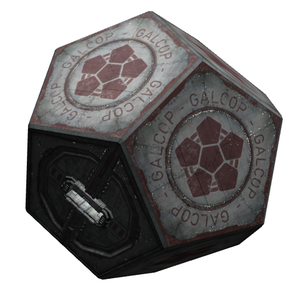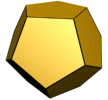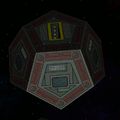Difference between revisions of "Dodecahedron Station (Oolite)"
From Elite Wiki
Cholmondely (talk | contribs) m (Death to typos!) |
Cholmondely (talk | contribs) (→Links: Added another) |
||
| Line 26: | Line 26: | ||
*[[Coriolis Station (Oolite)|Coriolis Station]] | *[[Coriolis Station (Oolite)|Coriolis Station]] | ||
*[[Rock Hermit (Oolite)|Rock Hermit]] | *[[Rock Hermit (Oolite)|Rock Hermit]] | ||
| + | *Analysis of different doecahedron stations: [[P.A. Groove Stations backgrounds]] | ||
[[Griff Industries#Other OXPs|Dodo Stations OXP]] | [[Griff Industries#Other OXPs|Dodo Stations OXP]] | ||
Revision as of 01:42, 1 January 2021
| Dodecahedron Station | |
|---|---|

| |
| Size (metres, W×H×L) | 1000 x 1000 x 1000 |
| Manoeuvrability | Roll: 8.0 Pitch: 8.0 |
| Rotating | Yes |
| Energy recharge rate | 100 |
| Armaments | None |
| Defenders | GalCop |
| OXP or standard | Standard |
| Beacon | N |
Overview
The Dodecahedron stations, commonly called Dodos, are now a common sight in high-tech systems. The first prototype of the basic GASEC model went into orbit around Leesti in 3141. At that moment the Leesti Coriolis was wiped out by the comet Hal 9001. Scientists luckily predicted this impact a few months before the event after a major asteroid storm in the region. The new Dodo model could withstand impacts for much longer but it remains unclear why the new station was placed exactly in the same risky spot (SPACE magazine claims budgetary reasons). The Dodo-station proved to be a success.
The Dodo stations' landing dock size is the standard 192m x 64m x 250m (WxHxL)
Custom Paintjobs
Links
See also:
- Icosahedron Station
- Coriolis Station
- Rock Hermit
- Analysis of different doecahedron stations: P.A. Groove Stations backgrounds

